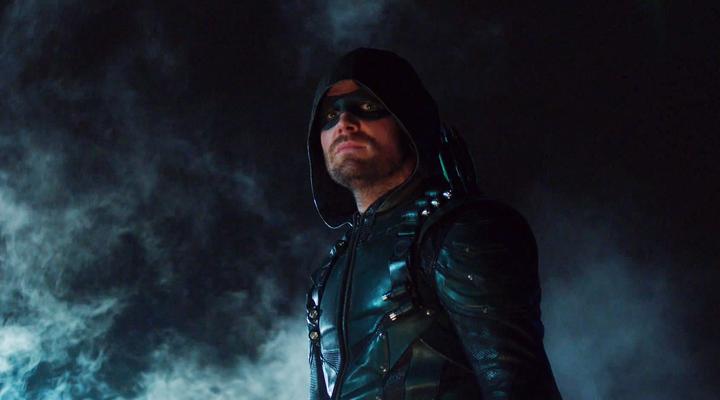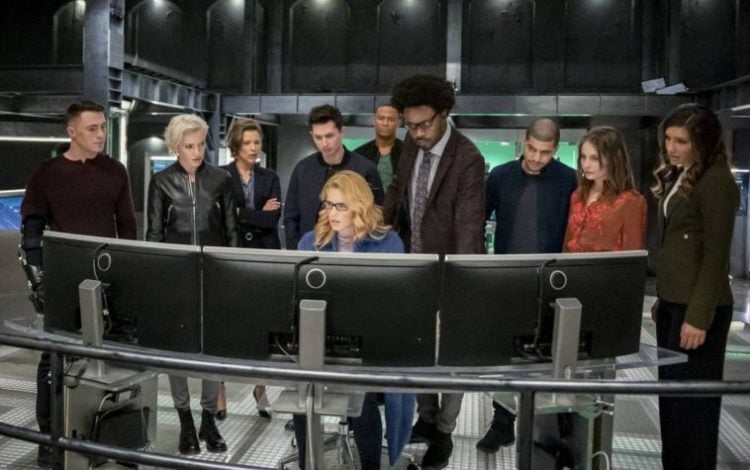
Though we knew from the Crisis finale that Oliver sparking the rebirth of the multiverse significantly affected the Arrowverse. What we didn’t know what just how much of Arrow would be different because of it. “Fadeout” paints this new picture in a slightly jumbled first act where many of the characters gone for years — Tommy, Moira, and Quentin, to name a few — were revived thanks to Oliver’s final act. But all those lost do not return. Robert Queen is one such soul that remains dead, as does the Earth-One Laurel. The uncertainty of why she wasn’t returned haunts the current Laurel (formerly of Earth-Two) and she blames herself for what she sees as a mistake. In a touching scene, Quentin reminds Laurel that there’s nothing in her that needs changing. It’s a watershed moment for this Laurel who, for so long, has fought to live up to the hero ideal the original Laurel left behind. Quentin’s words solidify this version of Laurel Lance as every bit of the hero as his daughter was, and there is no better place to have this indelibly inscribed than in this soulful finale.

It’s moments like these that make “Fadeout” such a special end to a long and arduous journey. Notwithstanding the mini-narrative of teenage William being kidnapped by John Byrne — a man Oliver spared this time around after killing him in the original timeline — “Fadeout” is a mashup of the emotional beats usually reserved for breaking up the action or plot-driven narrative. Though Mia gains the confidence to take on her father’s mantle after saving William, this was an unnecessary direction whose time would have been better allocated to returning characters like Rory, Tommy, and Thea. Instead, the former two get very little screen time and Thea — well, it looks as if she and Roy will have their happy ending since she accepts his marriage proposal.
Of all the interactions, the single most impactful face-to-face was Felicity seeing her daughter all grown up. Just like Oliver, Felicity is overcome with both the joy and improbability of the circumstances. For her to be able to speak to her daughter without the pain, anger, or resentment that colored their relationship in last season’s morbid future, was about as incredible a gift as she could have hoped for. Katherine McNamara continued where she left off last week, embodying the traits necessary to carry on the mantle of Green Arrow. It was wonderful to see Emily Bett Rickards back for this final goodbye and even better that Felicity, so like Steve and Peggy in Endgame, gets her own final dance with her love spending the afterlife with Oliver in a world of his creation, just for the two of them. It may not be Heaven in the Biblical sense but spending eternity (if it is that) with the one you love most… there may not be a greater paradise.

As satisfactory as it was to see some of these familiar faces, the night was about Oliver and how best to say goodbye to a network icon. “Fadeout” gives Arrow fans what we deserved, with both Quentin and John sharing their own special goodbyes to the hero, not only of Star City but the multiverse. Whereas Quentin’s speech is a capstone on Oliver’s life — as well as the christening of the monument erected in his honor, Diggle’s is more about moving on with life, taking on the challenges that await and doing Oliver proud, facing them as he would. As a hero would. It’s an apropos direction for one as John Diggle whose final scene is that of him picking from a meteor crash what looks to be a ring. One pulsing with green light…

Finales are such fickle beasts, as likely to miss and disappoint as they are to satisfy. For me at least, “Fadeout” is as fitting an end as I could have hoped to have for Oliver Queen. It’s not perfect and would have been better served as just a character ensemble piece instead of shoehorning in the kidnapping plot. Still, to see so many of the people that were major parts of Oliver’s life able to give him a proper sendoff was magnificent. There were three or four occasions — all within the second half — where it was difficult to hold back my emotions and as someone who was not a fan of Oliver’s final goodbye in Crisis, “Fadeout” was its own little rebirth for me.
Throw out the action or the nostalgic glimpses into the past, what this finale did as well as could be expected was to have this massive cast of characters all share a moment (sometimes indirectly) of Oliver’s impact on their lives. Though this iteration of Arrow that many of us have liked or loved (and, at times, loathed) comes to an end, the mission — as Diggle says — is never over. It may come in a different form and while Star City may be free and clear, the world vast is a place filled with as much danger as it is wonder. And there will be many who, at some time or another, will need a hero to answer the call.

You Have Saved This City
From a plot standpoint, “Fadeout” answers last week’s question on how crime in Star City disappeared for nearly two decades. Like the resurrection of Tommy, Quinten, and the others, Oliver was able to manipulate the rebirth as a reward, to himself and especially to the city he loved so much. Save for maybe Oliver and Felicity, “Fadeout” was not a goodbye. It was more of a “see you around” type ending where paths were laid before some of our favorites, with Diggle having the most unbelievable of ends. Over the years, many people have talked about David Ramsey being the perfect John Stewart and that thread is left open as he picks up what I believe to be a ring from the Green Lantern Corp. Whether we see his journey continue — in live-action or something more manageable, like an animated spin-off — is not the point. Rather it’s the possibility of it all that’s most exciting.
Throughout Crisis, I mentioned more than once how similar the events were to Avengers: Endgame. “Fadeout” further emphasizes this, not only with the those once dead being returned but even Oliver and Felicity getting their own patch of Heaven. Much like Endgame was not the best or my favorite MCU film, neither is “Fadeout” the best the Arrowverse has offered. Where this finale parallels the MCU’s swan song (as it has been thus far) is creating a level of emotional satisfaction, joy, and heartbreak not achieved by any single episode in the entirety of the Arrowverse. Some may call this recency bias and they may be right. All I know is that I will remember “Fadeout” with a warm and bittersweet smile for years to come.

